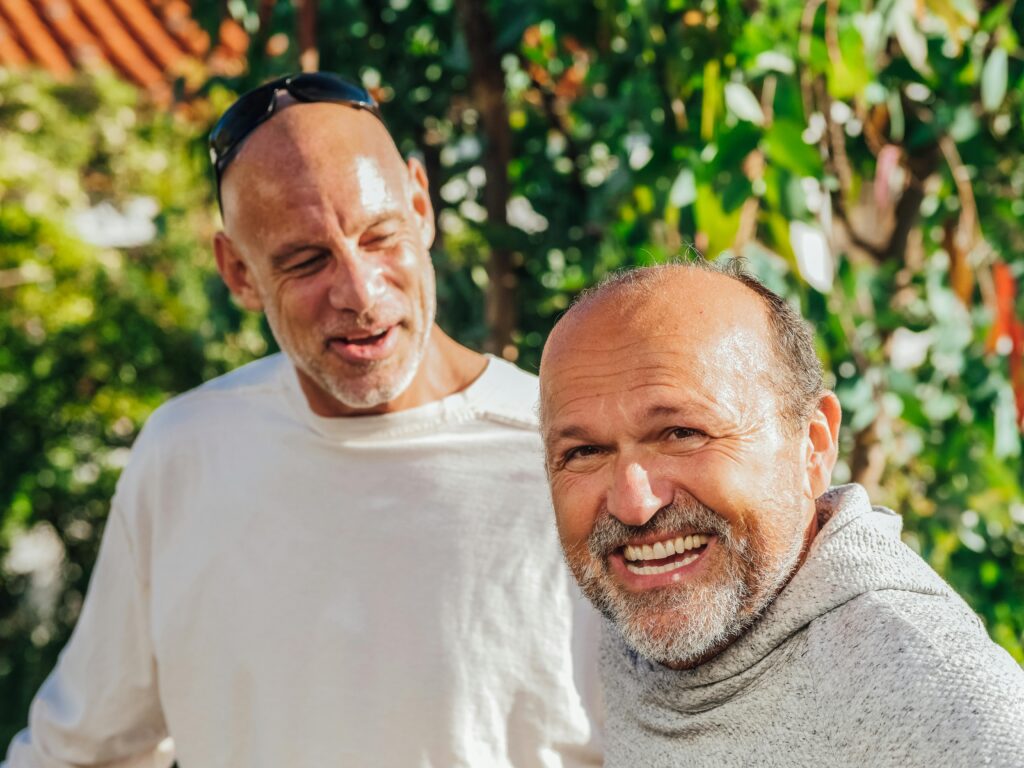Introduction
When it comes to men’s health after 35, it can feel like standing at the midpoint of life’s marathon. You’re not “young” in society’s eyes anymore, but you’re far from old. And yet, many men in this stage find themselves facing silent battles—mental and physical health struggles, career or financial pressure, and an unsettling sense of isolation.
This is emphasized in The 19th News’ article “The State of American Men Is – Not So Good”. In the article, they highlight a new report that reveals, “men are struggling with isolation, economic pressure and toxic online influences. But redefining masculinity and valuing men as caregivers could point the way forward.” They site a report published by Equimundo: Center for Masculinities and Social Justice which underscored how societal pressures, particularly the expectation to be a “provider,” are taking a heavy toll…men are suffering primarily because of what they lack-meaningful relationships, economic stability, and healthy gender norms.”
The challenge? Traditional masculinity often teaches men to “man up” instead of asking for help, making these problems worse.
Many men enter their mid-30s and feel an invisible weight pressing down on them. It’s the age when careers hit full stride, family responsibilities multiply, and bodies no longer bounce back as quickly as they did at 25.
Research shows that by age 35, most men begin to experience measurable changes in metabolism, muscle mass, and even hormone levels. At the same time, financial obligations peak—mortgages, childcare, or saving for retirement—all while friendships and social networks often shrink. That’s why men’s health after 35 requires a holistic approach: mental resilience, physical fitness, financial foresight, and stronger human connections.
This is where the conversation around men’s health after 35 becomes urgent—not just for fitness or diet, but for a complete reinvention of how men live, connect, and thrive.
The Mental Toll: Why Men Struggle in Silence
Studies show that men over 35 are less likely than women to seek therapy or talk about their struggles, even though depression and anxiety rates climb significantly during midlife. Add career pressures, parenting, divorce, or financial instability, and the mental load grows heavier.
According to the CDC, nearly 1 in 10 men report experiencing daily feelings of anxiety or depression, but less than half ever seek treatment. What makes it worse is that men between the ages of 35 and 54 have one of the highest suicide rates across all age groups. The stigma around mental health—especially for men who’ve been raised to “tough it out”—can prevent them from taking action until it’s too late.
Modern science is proving that mental well-being is as critical as physical strength. Regular meditation, even for 10 minutes a day, has been shown to reduce cortisol (the stress hormone) and improve focus. Practices like journaling or “micro-breaks” at work also protect mental stamina. More importantly, therapy isn’t just for crises—it can be used as a performance tool to gain clarity, boost decision-making, and manage life transitions.
For men’s health after 35, the brain deserves the same investment as the body. Think of it as mental weight training: the more you exercise emotional awareness, the stronger you become in handling challenges.
One of the biggest barriers? The cultural script of masculinity: “Don’t be weak. Don’t complain. Handle it yourself.” Unfortunately, bottling emotions can lead to burnout, unhealthy coping habits, and even physical health problems.
👉 Action Step: Break the silence. Even talking to one trusted friend, joining a men’s group, or considering therapy can dramatically improve mental resilience. Your strength isn’t measured by how much you carry—but by how wisely you choose to share the load.

The Body After 35: From Strength to Longevity
By the mid-30s, men typically start noticing subtle shifts—slower recovery from workouts, stubborn belly fat, or fatigue that lingers longer. Harvard studies show that men lose roughly 3–5% of muscle mass per decade after 30 if they don’t actively maintain it. This muscle loss also affects metabolism, making weight gain more likely.
The good news? A strategic approach can slow and even reverse many of these changes. Resistance training just twice a week can help maintain testosterone levels and bone density. Adding activities like swimming, cycling, or martial arts builds cardiovascular health while keeping exercise enjoyable. Nutrition also plays a starring role. Increasing omega-3 fatty acids (from fish, nuts, and seeds) supports heart health, while foods rich in zinc and magnesium can help balance hormones.
Sleep hygiene is another underestimated pillar of men’s health after 35. Men who average fewer than 6 hours of sleep a night face a 30% higher risk of heart disease compared to those who consistently get 7–8 hours. Prioritizing rest is not laziness—it’s one of the most powerful forms of preventative medicine.
Testosterone levels decline by about 1% per year after age 30, which can affect energy, weight management, and even mood. That doesn’t mean decline is inevitable—it just means men need to adjust their approach.
- Fitness: Focus on strength training to preserve muscle mass, but balance it with mobility and cardio.
- Nutrition: Protein-rich diets, fewer processed carbs, and increased whole foods keep energy levels up.
- Sleep: Quality sleep isn’t a luxury—it’s the most powerful performance booster available.
Men’s health after 35 isn’t about looking like a bodybuilder—it’s about creating stamina, strength, and vitality for the decades ahead.

Career and Financial Pressures: The Midlife Crossroads
By 35, many men feel the squeeze of competing priorities—mortgage payments, childcare, aging parents, or the pressure to hit peak career performance. Financial stress is one of the top contributors to mental burnout in men.
At 35, most men are either hitting their professional stride or questioning if they’ve chosen the right path. The pressure can be immense—especially in today’s economy where layoffs, automation, and industry shifts are common. The average American man has about $53,000 in retirement savings by their mid-30s, but experts suggest that figure should be closer to one year’s salary. That gap alone can cause deep financial anxiety.
This is why men’s health after 35 isn’t just about gym time—it’s also about building financial fitness. Automating savings, creating a diversified investment plan, and learning new professional skills can reduce career uncertainty. Men should also view career change as evolution, not failure. Many high achievers pivot industries after 35 to align work with personal fulfillment.
One overlooked area? Negotiation. Studies show men who regularly negotiate salary earn up to $1 million more over their lifetimes. Career reinvention isn’t only possible after 35—it’s often the most strategic move you can make.
Here’s the truth: careers rarely follow a straight line. Many men reinvent themselves after 35—shifting industries, starting businesses, or pursuing passion-driven side hustles.
👉 Action Step: Instead of comparing yourself to peers, set a 5-year “life blueprint.” Where do you want to be in health, career, and relationships by 40? Reverse-engineer steps now.
Pro tip: Automating savings, diversifying income, and focusing on skill-building creates financial stability that supports both freedom and peace of mind.
The Quiet Threat: Social Isolation in Men Over 35
One of the most overlooked challenges in men’s health after 35 is loneliness. Studies reveal that men’s social circles shrink dramatically after their 30s. Careers, marriage, and kids often take priority, leaving fewer strong friendships.
Loneliness doesn’t just hurt emotionally—it’s linked to higher risks of heart disease, obesity, and early mortality.
Loneliness in men has been described as an epidemic. A 2023 study by the American Survey Center found that only 27% of men report having six or more close friends, compared to 55% in 1990. Nearly 15% of men today say they have no close friendships at all. Social isolation is not just an emotional struggle—it increases the risk of premature death as much as smoking 15 cigarettes a day.
Why does this happen? Work, marriage, and parenting responsibilities often push friendships to the background. Unlike women, who typically maintain social bonds through consistent communication, men’s friendships often revolve around shared activities. When those activities fade, so do the connections.
For men’s health after 35, rebuilding community is vital. Whether it’s joining a sports league, reconnecting with old friends, or participating in online groups that meet offline, intentional effort can counteract isolation. Remember: strong relationships aren’t just “nice to have”—they’re as critical as diet and exercise in determining longevity.
👉 Action Step: Reconnect intentionally. Join a hobby group, a men’s support community, or reconnect with old friends. Even one weekly social interaction outside of work or family can significantly reduce stress and improve happiness.

Breaking Free from Masculinity Myths
The biggest barrier to men’s health after 35 isn’t biology—it’s mindset. The myth that men should never show vulnerability or ask for help leaves countless men trapped in silence.
Real strength is knowing when to adjust course, when to ask for support, and when to prioritize health over appearances. This isn’t weakness—it’s leadership over your own life.
Cultural expectations still weigh heavily on men. The old playbook—be the provider, show no weakness, solve everything alone—creates silent suffering. A study in the Journal of Men’s Studies found that men who strongly adhere to “traditional masculinity” norms are less likely to seek preventative healthcare and more likely to engage in risky behaviors.
But times are changing. Today, redefining masculinity means recognizing that vulnerability is not weakness—it’s a superpower. The ability to admit challenges, ask for support, and take proactive steps is what allows men to thrive long-term.
The truth is, men’s health after 35 depends less on outdated ideals and more on adopting a growth mindset. Resilience isn’t about pretending problems don’t exist—it’s about facing them head-on with the courage to adapt.
Final Thoughts: Thriving, Not Just Surviving
Men’s health after 35 is a journey of reinvention. It’s not about clinging to youth—it’s about building a life of strength, resilience, and purpose. Mental wellness, financial security, and meaningful social connections matter just as much as physical health.
Life after 35 doesn’t have to be a slow decline. It can be a launching pad. By prioritizing mental wellness, building financial confidence, staying physically active, and maintaining strong social ties, men can create a second act that’s richer than their first.
If you’re in your mid-30s and feeling the weight of expectations, remember this: men’s health after 35 isn’t about perfection—it’s about progress. Every small adjustment compounds into massive results over the next decade. Your best years aren’t gone—they’re waiting for you to take charge and define them.
When it comes to men’s health after 35, the truth is, your best years aren’t behind you—they’re ahead, if you’re willing to redefine what it means to be a man.
Men’s health after 35 doesn’t have to follow the typical downward spiral. Turn your life after 35 into your greatest season in life. Need help reinventing your life? Discover your Reinvention Readiness Score. I invite you to take the free Reinvention Quiz and receive your free Reinvention Blueprint on my site. In 90 seconds, you’ll get a custom roadmap to help you start over after 35 and become unstoppable. * Note: For access to the quiz, we recommend using Chrome, Edge, Firefox, or Safari. Privacy browsers like DuckDuckGo may prompt you to log into Google.
Visit 👉 nextmissioncoach.com to schedule your free call and learn how the 12-week one-on-one reinvention coaching program can help you rebuild your confidence, clarity, and purpose.
Anthony V. Johnson is a personal development coach helping men over 35 reclaim their energy, clarity, and life purpose through personal development strategies and burnout recovery systems. Follow me on LinkedIn
#MensHealth #LifeAfter35 #MensMentalHealth #FinancialStability #Over35Lifestyle #PersonalDevelopmentCoach #NextMissionCoach

